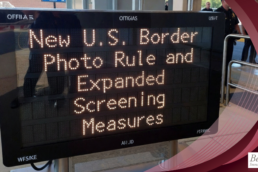On April 13, 2020, USCIS released guidance on what to do if a foreign national cannot depart the United States before their nonimmigrant status expires due to COVID-19. Typically, a nonimmigrant must depart the United States before their authorized period of admission expires. However, USCIS recognized that nonimmigrants may unexpectedly need to remain in the United States beyond their authorized period of stay due to COVID-19. If this is the case, USCIS has noted the following options available for nonimmigrants:
- Apply for an extension – Most nonimmigrants can mitigate the immigration consequences of COVID-19 by filing an application for extension of stay (EOS) or change of status (COS) before their current expiration is up. USCIS continues to accept and process applications and petitions.
- If you file in a timely manner – Nonimmigrants generally do not accrue unlawful presence while the timely-filed, non-frivolous EOS or COS application is pending. Where applicable, employment authorization with the same employer, subject to the same terms and conditions of the prior approval, is automatically extended for up to 240 days after the I-94 expiration when an EOS is filed on time.
- Flexibility for late applications – USCIS reminds petitioners and applicants that it can consider delays caused by the COVID-19 pandemic when deciding whether to excuse delays in filing documents based on extraordinary circumstances.
- What to do if you file late – Under current regulations, if a petitioner or applicant files an EOS or COS request after the authorized period of admission expires, USCIS may use its discretion to excuse the failure to file on time if it was due to extraordinary circumstances beyond their control, such as those who may be impacted by COVID-19. The length of delay must be commensurate with the circumstances. The petitioner or applicant must submit credible evidence to support their request, which USCIS will evaluate on a case-by-case basis.
- Flexibility for Visa Waiver Entrants – Visa Waiver Program (VWP) entrants are not eligible to extend their stay or change their status. However, under current regulations, if an emergency (such as COVID-19) prevents the departure of a VWP entrant, USCIS may use its discretion to grant a period of satisfactory departure for up to 30 days. For those VWP entrants already granted satisfactory departure and unable to depart within this 30-day period because of COVID-19 related issues, USCIS has the authority to temporarily provide an additional 30-day period of satisfactory departure. To request satisfactory departure from USCIS, a VWP entrant should call the USCIS Contact Center.
If you have questions on how COVID-19 may impact your immigration status, be sure to contact Berardi Immigration Law to speak to one of our attorneys today!
Ready to have Berardi on your side?
Whether you’re a business looking to hire or a professional hoping to relocate, immigration law can be complicated. But you don’t have to do it alone. Put our experience to work for you.



